By all accounts Miss Augusta Yates was a force to be reckoned with. Born December 14, 1852, Miss Yates was the daughter of Lewis Augustus and Martha Ann Rosson Yates. The couple had two daughters, Augusta and her elder sister Ella, born in 1849.
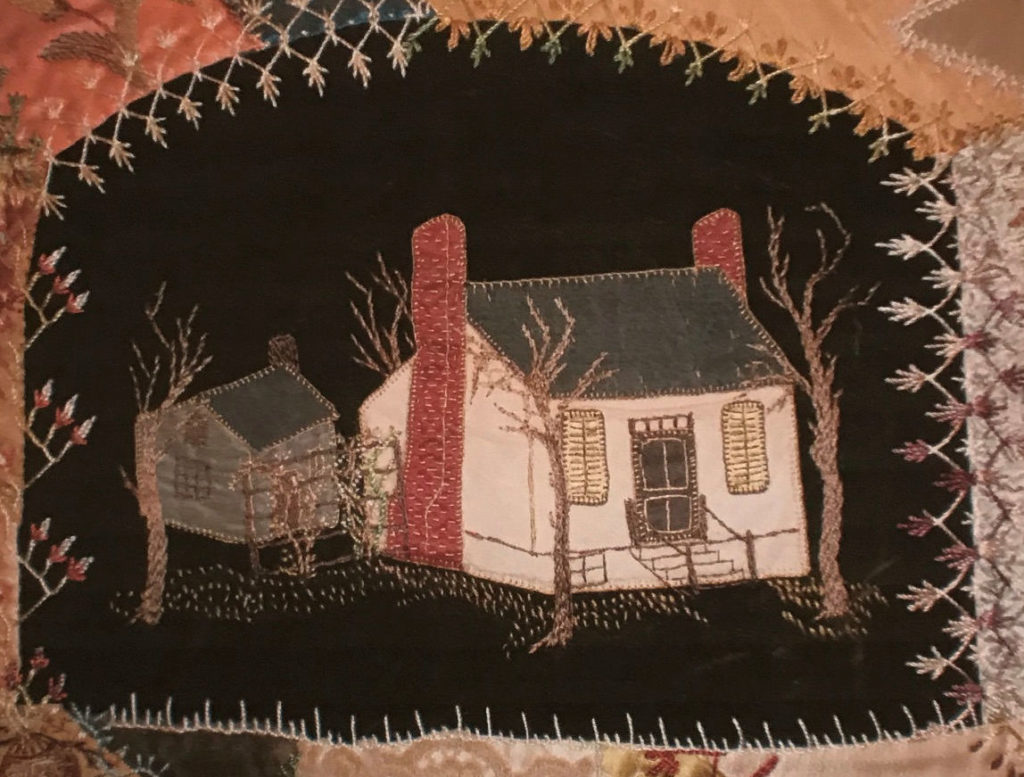
The Yates family, natives of Pittsylvania County, had arrived in Danville by 1851, when Lewis purchased a small home on the 600 block of Main Street where the Leeland hotel is located today. Later, Ella, an accomplished seamstress, would sew a crazy quilt depicting what is believed to be that first Main Street home. The quilt hangs today at the Danville Museum of Fine Art and History. In 1860, Mr. Yates sold that house to Arthur Baugh and bought two lots across the street where the Hotel Danville now stands.
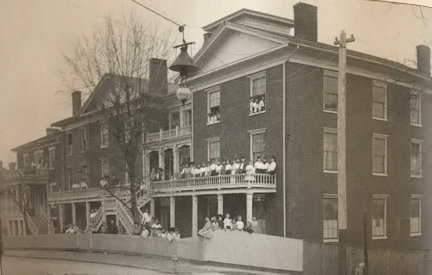 Augusta attended Roanoke Female College (now Averett) in the days when it was located on the corner of Ridge and Patton Streets (where Bisquitville formerly stood). Here she studied art and learned to draw and to paint in oil.
Augusta attended Roanoke Female College (now Averett) in the days when it was located on the corner of Ridge and Patton Streets (where Bisquitville formerly stood). Here she studied art and learned to draw and to paint in oil.
Augusta was only twenty when she created an organization to memorialize the fallen Confederate dead. It was by her ingenuity that the Ladies’ Memorial Association of Danville was formed and through it annual banquets and parades were held. The organization also raised funds to erect the Confederate memorial in Green Hill Cemetery.
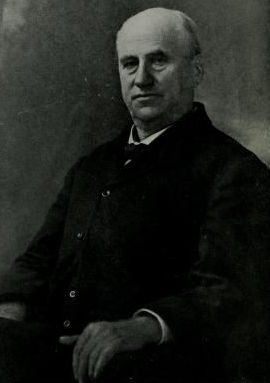
Augusta’s mother Martha passed away in 1877, and in 1885 her father Lewis died of chronic hepatitis. Augusta and her sister Ella remained in their second Main Street home until 1890 when the city purchased the property with the intention of building a municipal building there. By then, Ella was married to city judge Archibald Aiken. After the sale of the Yates home, Augusta lived with her sister and brother-in-law, first in the Stokesland Precinct (according to the 1900 Census) and then in a home on the corner of West Main and Stewart Streets (where Townes Funeral Home is now located).
It was in 1893 that Miss Augusta had the idea of starting a literary club – the infant beginnings of The Wednesday Club. She had previously been exposed to such an organization while visiting friends in Wilmington, North Carolina. Selecting eleven of her closest friends, she issued invitations to meet in her brother-in-law’s home. The organization at its outset was chiefly concerned with elevating the female mind through the study of improving literature. Such clubs were popular in the late Victorian era when women were hungry for something more to occupy their time and their minds than their otherwise limited resources would allow. Miss Yates never married, and so her time and her energies must be dedicated to other things. She apparently had no shortage of energy considering all she accomplished.
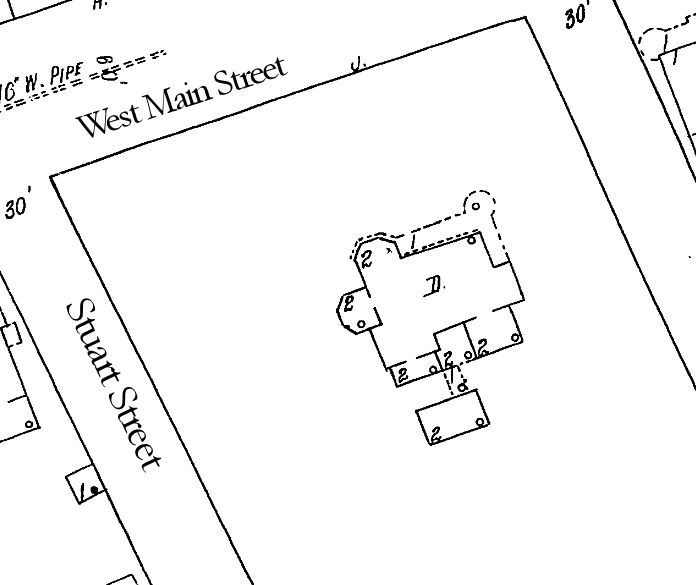
Over time, Miss Yates began to feel that the Club should be about more than the personal improvement of its limited membership but should expand its efforts toward “good works” throughout the community. The organization took up the cause of public welfare and through Miss Augusta’s guidance and leadership, members of the organization visited schools to investigate sanitary conditions, they petitioned the city to remove unsightly fencing around Green Street Park, they enforced an ordinance against spitting in the street and demanded a mandate that required covers for garbage cans. In 1925, the organization set up the Crippled Children’s Clinic and ran it successfully (at times serving over a thousand children and adults a year) for some 25 years before the program was turned over to the state.
By 1905, the membership had grown large enough to make their drawing room meetings inconvenient. With membership dues and fund raising they rented a room above the West End Pharmacy (location of Crema and Vine today). Later they met in a room of the First Baptist Church and then Sutherlin Mansion. The Wednesday Club took a large role in raising the funds necessary to remodel Sutherlin Mansion’s interior so that a library could be established within its walls. In 1921, however, it was decided a permanent location for the club was necessary. The organization purchased the Walker House at 1002 Main Street for $15,000 and spent another $3,200 remodeling it. In 1923, The Wednesday Club held its first meetings in their new location.
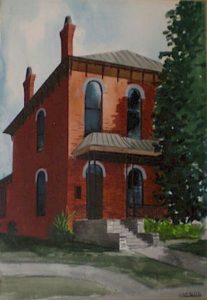
By 1962, the Club was outgrowing its home and plans for a new building were made. The lot next door, at 1006 was acquired and the house that stood there (the Rison-Puryear House) was razed. Later, in 1969, the Walker home was razed as well, and preparations were made to construct a new building. In April of 1970, the first cornerstone of the new building was laid. Among the many appointments preserved from the old home for use in the new building and on its property (including the magnolia tree which was recently removed in order to save the building’s foundation) are a set of silver knives (six dozen of them), two large gilt mirrors, the chandelier and ceiling medallion in the Board Room, and two medallions in the entrance hall (see the companion post for images of some of these).
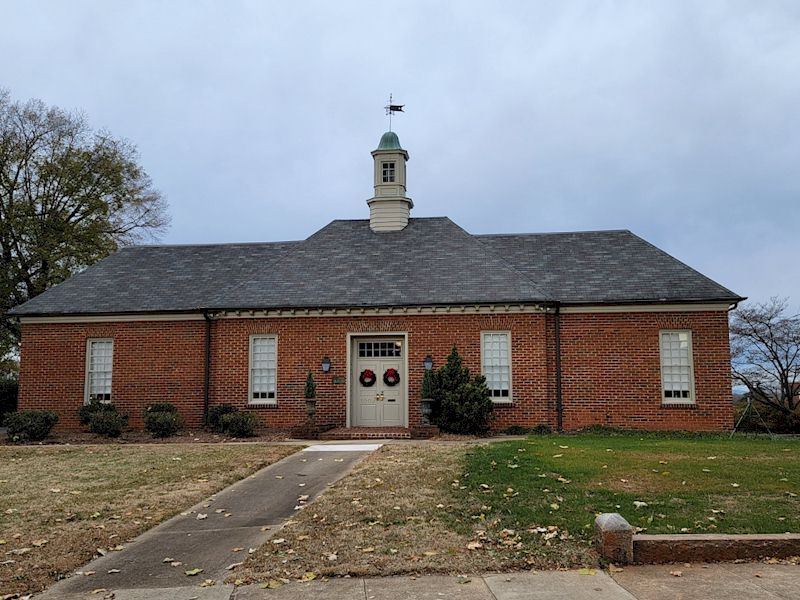
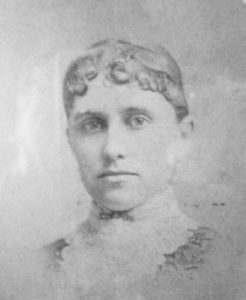 Augusta Yates spent the last years of her life as a boarder at the Wheatley House, 162 Sutherlin Avenue, where she lived until she died on the 24th of February 1932 after suffering a cerebral hemorrhage. She was a woman of her age (a thorough woman of the Reconstruction, as some described her) but also ahead of her times in many ways. She was certainly a woman remembered for her energies and accomplishments. A headstone erected for her by her nephew, Archibald Aiken, Jr., accredits her with starting The Wednesday Club as well as the Shakespeare Club, an organization with which, in reality, she was not directly affiliated. Her name is also spelled incorrectly. Perhaps in his grief he failed to pay attention to the details. Efforts are currently underway to remedy this mistake, but whether or not they succeed, her name and example are held in reverence by many even today.
Augusta Yates spent the last years of her life as a boarder at the Wheatley House, 162 Sutherlin Avenue, where she lived until she died on the 24th of February 1932 after suffering a cerebral hemorrhage. She was a woman of her age (a thorough woman of the Reconstruction, as some described her) but also ahead of her times in many ways. She was certainly a woman remembered for her energies and accomplishments. A headstone erected for her by her nephew, Archibald Aiken, Jr., accredits her with starting The Wednesday Club as well as the Shakespeare Club, an organization with which, in reality, she was not directly affiliated. Her name is also spelled incorrectly. Perhaps in his grief he failed to pay attention to the details. Efforts are currently underway to remedy this mistake, but whether or not they succeed, her name and example are held in reverence by many even today.
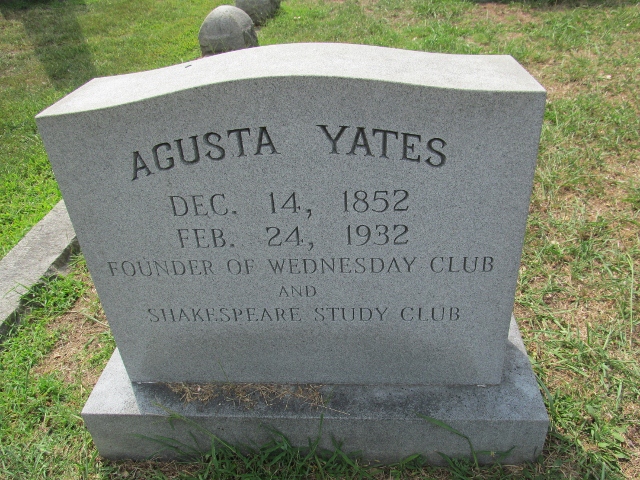
Sources:
History of The Wednesday Club, and History of Miss Augusta Yates, and other compilations of historical paraphernalia related thereunto by the incomparable Clara Fountain, including histories written by others of the Club’s presidents and historians.
History of the Wednesday Club by Miss Augusta yates 1899, provided by Clara Fountain
The Wednesday Club: A Brief History (brochure) compiled and written by Mary Jo Davis based on…
The Wednesday Club: One Hundred Years (1993) written by Ms. Pauline Coll and Dr. Margaret Lanham
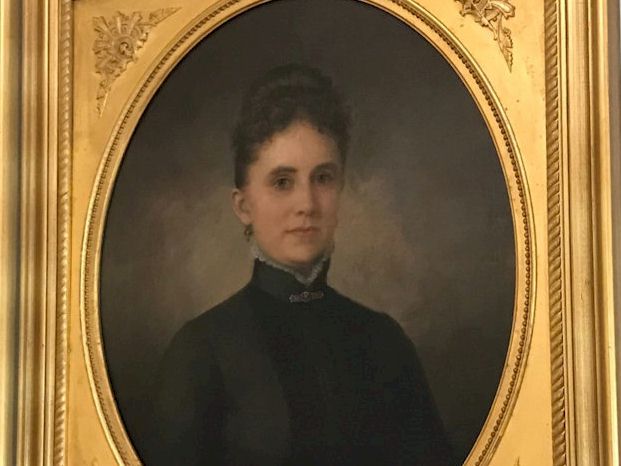
Very interesting about Ms Yates etc. Went to a concert at the Women’s club with my mother once — memorable.